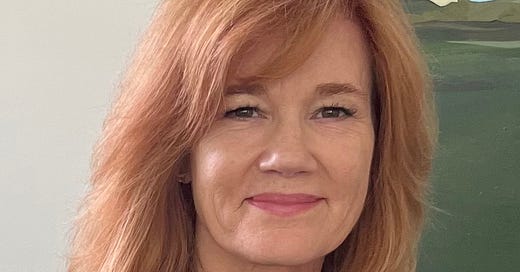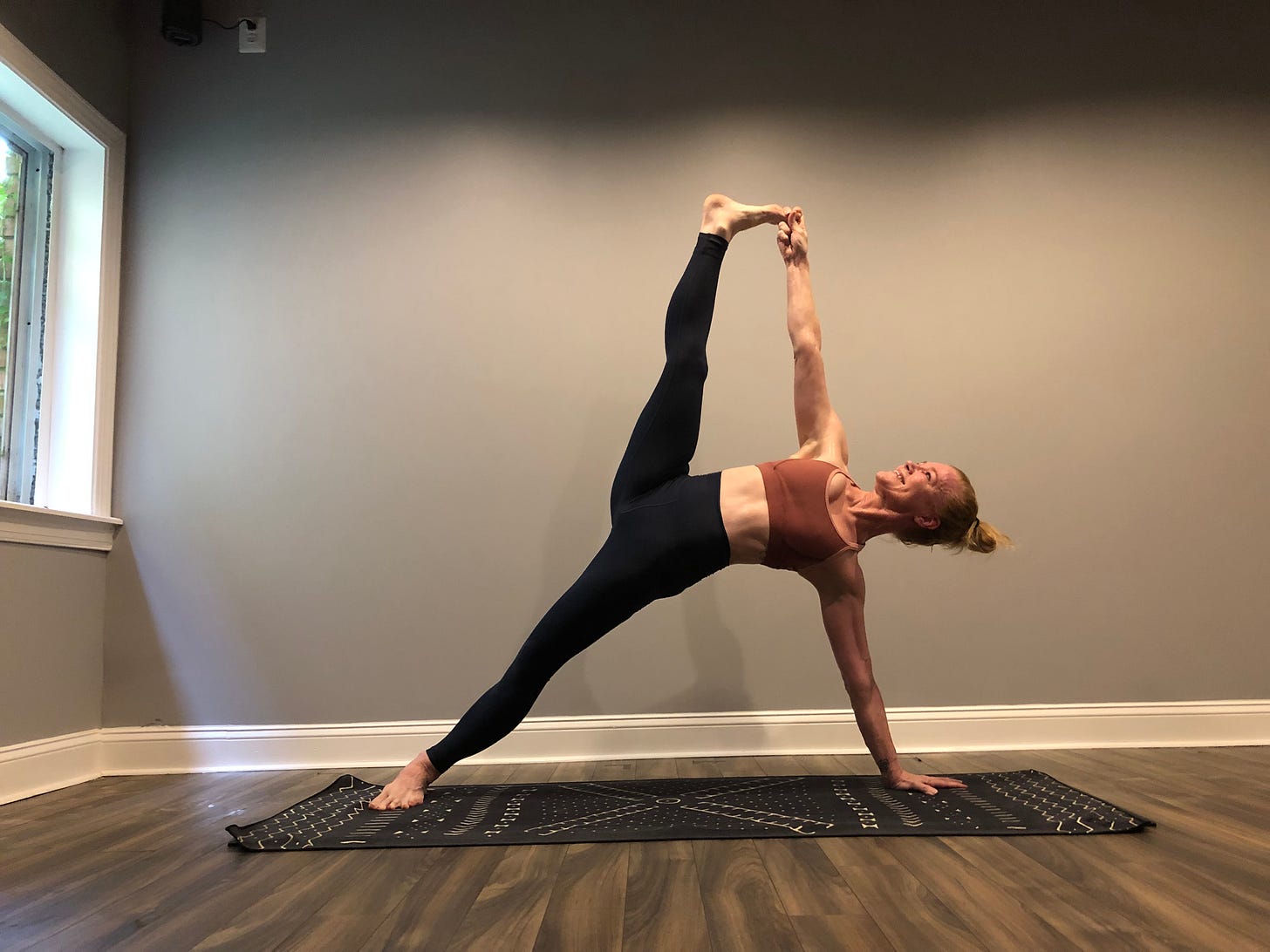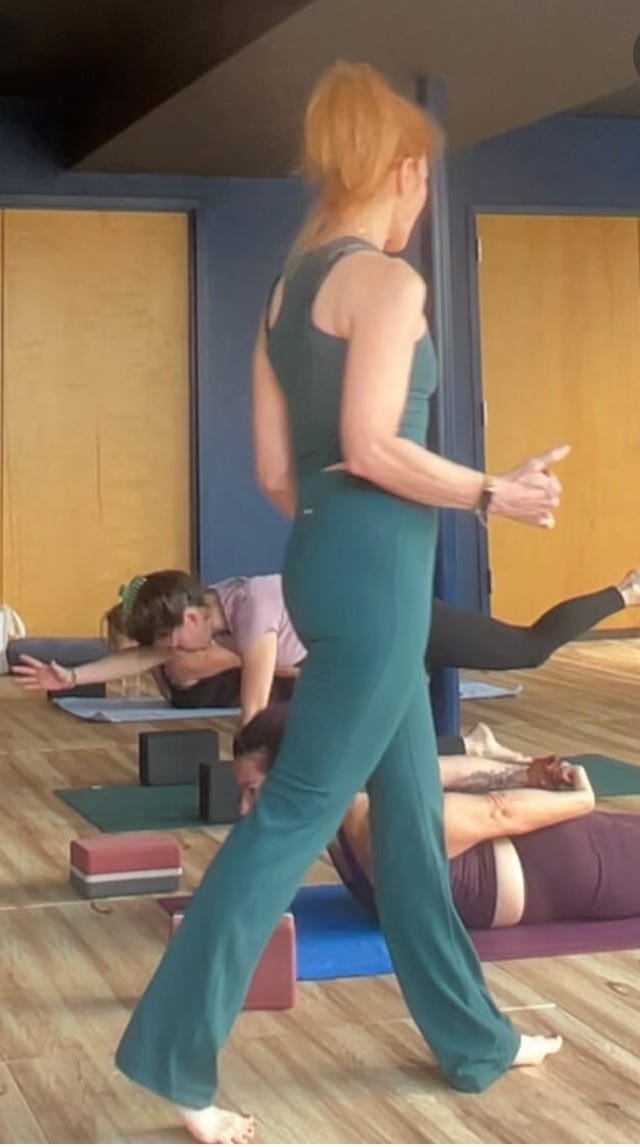Andrea Jarrell on Embracing the Days of Small Beginnings
On discovering our true potential through (lots of!) practice
Back in the day, before Substack existed, Facebook offered a thriving writer’s community. And that’s where I met Andrea Jarrell. I instantly fell in love with her writing. Crisp, tender, and compellingly honest, I was moved by Andrea’s take on the world.
I was also bowled over by the photos Andrea posted of the magnificent yoga poses she managed to finagle herself into. It was clear how deeply meaningful yoga was to her life, how it was shaping her. And it was inspiring to watch Andrea’s progress as a practitioner. Her crow pose is a thing of wonder!
Andrea’s gorgeous memoir, I’m the One Who Got Away, was a Kirkus Reviews Best Book of 2017. Her essays have appeared in The New York Times, Literary Hub, Harper’s Bazaar, The Rumpus, the Washington Post, amongst others.
I’m delighted to share this essay that explores the intersection of writing and yoga — and the power of practice.
Enjoy!
xJane
Embracing the Days of Small Beginnings
Throughout my recent yoga teacher training, I kept thinking back to graduate school when I was earning an MFA in creative writing. That raw newbie feeling — wanting to be good, afraid of not being.
On the first weekend of the New Year, teacher training began with an icebreaker. One by one, ten of us stood before the group telling our stories. Gently, our mentors coached us on stance, voice, eye contact, gestures — beginning the process of drawing out the teachers we might become.
When it was my turn, I said I wasn’t really there to teach. I told the group that as a communications consultant working with nonprofits, I thought the leadership and coaching skills I would gain would make me a better partner to my clients. I also said the two things I spent most of my time doing — writing and yoga — were connected.
As I spoke, one of my co-trainers who’s been my yoga teacher for well over a decade said, “Try skipping around the room while you speak.”
With my knees high in big galloping motions, I skipped, weaving across the sunlit studio. Yes, he wanted me to loosen my upright, shoulders back posture. But it was more than that. He asked, “Can you bring that skipping quality into your voice?”
Could I? I’m not sure either one of us knew that he’d landed on the actual reason I wanted to do the training.
My best yoga teachers exude sparkling encouragement. The kind of encouragement that keeps you coming back to your mat to surprise yourself with your strength, your discipline, a forgotten playfulness. No matter what I’m doing or where I am, I carry with me the exhilaration of flying back from crow, my hard-won headstand, and the physical resilience that has transformed my sense of self.
Could I embody unguarded energy and joy that would invite others to find their own? And how much would it hurt if it turned out I couldn’t be a teacher like that?
When I first earned my MFA, I sent stories out like bottled messages into so many seas. They always came floating back. Discouraged, I stopped. Yoga is actually what brought me back to writing, inspiring in me the discipline and persistence I needed to return again and again to the page. Both writing and yoga take practice — both are a practice. “Practice” takes the pressure off, tells the ego to stand down, no need to worry about being perfect. This is just a practice. If you don’t get it right today, you’ll have another chance tomorrow. It was only after I started practicing yoga every day that I began to publish stories, essays and finally a memoir.
Inherent in the word “practice” is a belief that with practice one improves. Which brings me back to teaching yoga. As my weeks of training went by, each time I stood to lead the group through a sequence or a meditation, I felt like I was trying to cross a threshold from presentation to genuine connection. In the moments when I forgot myself, no longer reciting poses but was actually teaching to what I was seeing — feet planting, hands sparking, chests shining all to the flow of breath — it felt like a good writing day. I couldn’t quite explain it, but I knew it had something to do with shared connection, the human spirit revealing itself.
Yes, I was there like everyone else because I wanted to teach. I couldn’t protect myself by denying it. The style of yoga I practice and teach is a power vinyasa inspired by Baron Baptiste. In his book, Journey into Power, Baptiste describes two kinds of beginning practitioners. The ones who leave their expectations of perfection at the door and the ones who never come back because they can’t do every pose the way they want to from day one. He cautions against “despising small beginnings” because it’s only by going through these beginnings and moving on that we become truly skilled.
A week after graduating from teacher training, I co-taught my first class to a full house of seasoned practitioners. People I’d practiced side by side with for years. Afterward, when my mentor asked if I felt I’d hit any aspect of the class out of the park, I couldn’t say yes. I’d done fine. I wanted to do better. I spent the next few days trying not to despise my small beginnings.
I was reminded of what Ira Glass has called the creative taste-talent gap. He says, when you’re first “making stuff, what you’re making isn’t so good. But your taste is killer. . . the thing I would say to you is, everybody goes through that. [Put yourself] in a situation where you have to churn out the work, because it’s only by actually going through a volume of work that you actually then catch up and close that gap, and the work that you’re making will be as good as our ambitions.”
In other words, practice.
Any kind of apprenticeship program – whether you’re developing your craft as a writer or a yoga teacher – is like a cocoon. If you’re lucky that cocoon will nurture you. Your mentors and fellows will cheer you on as they witness where you started and how far you’ve come. They will see your progress as real success, and it is. But the standard outside of the cocoon is higher and the only way to close the taste-talent gap is to do the work. Because that’s the other thing about practice. No one can do it for you.
I’ve practiced yoga for 20 years with truly inspiring teachers. In the words of Ira Glass, I’ve got killer taste. If I want to be a great teacher, my ability needs to catch up to my aspiration. And the only way it will is if I practice. I’m teaching weekly now, constantly trying to cross that threshold for genuine connection. When I graduated from my MFA program, my mentors said, “Just keep doing what you’re doing.” But I quit, despising my small beginnings. This time, I’m embracing them.
If you enjoyed this essay by Andrea, you might like this one by
:









I love this post. Too much of me wants to leap into things, like across precipices. Not realistic, not a way that fosters growth. And the freedom of movement you mention— so real and lovely. I am a newbie to Substack, though not to writing — I love both the freedom of it and the discipline. I didn’t used to put those two words together, but they are very good friends. Thanks for the layers in this, Andrea. I will return to it. I know it!
I, too, have always found Andrea "compellingly honest" and been in awe of her yoga feats. Lovely article.